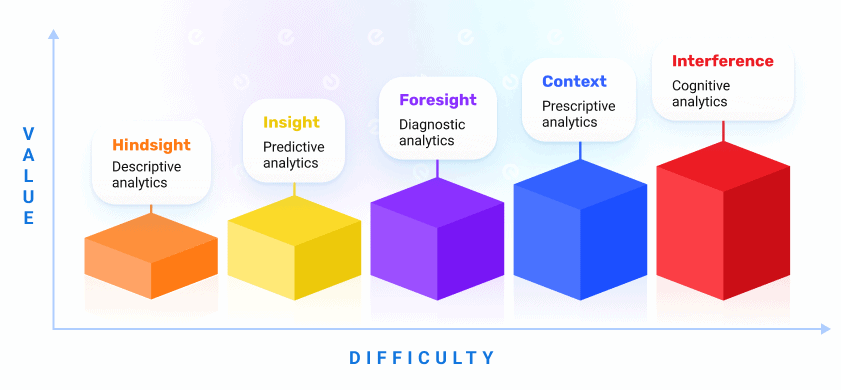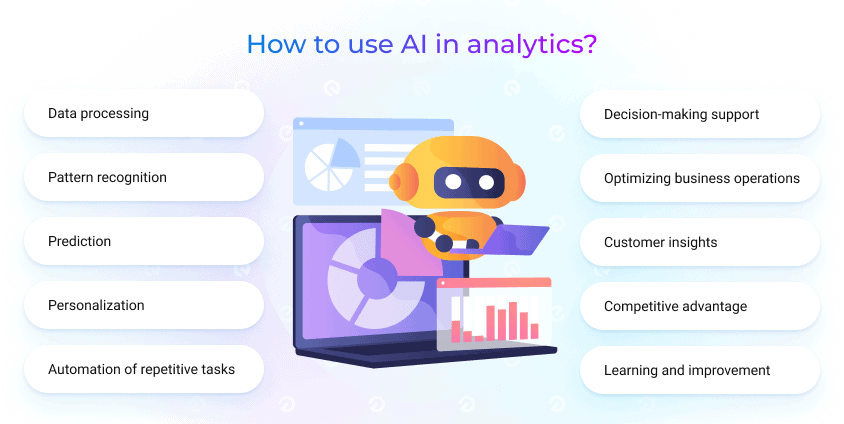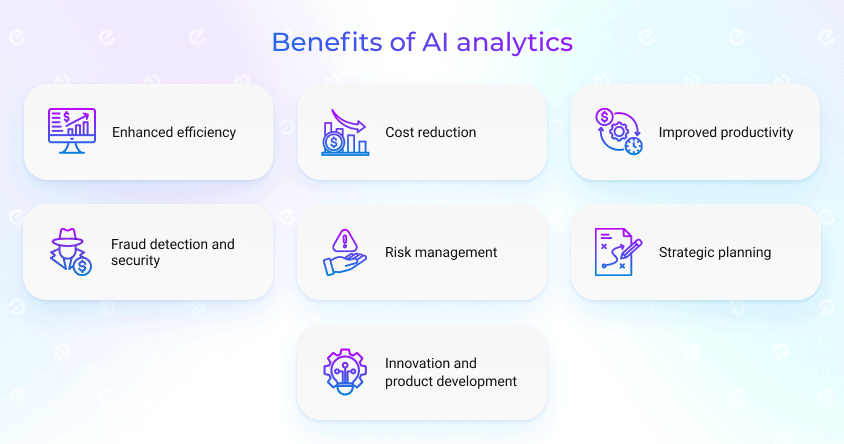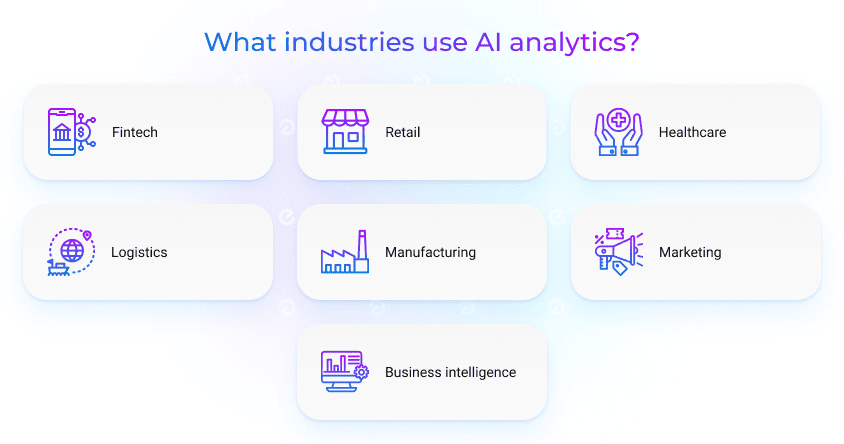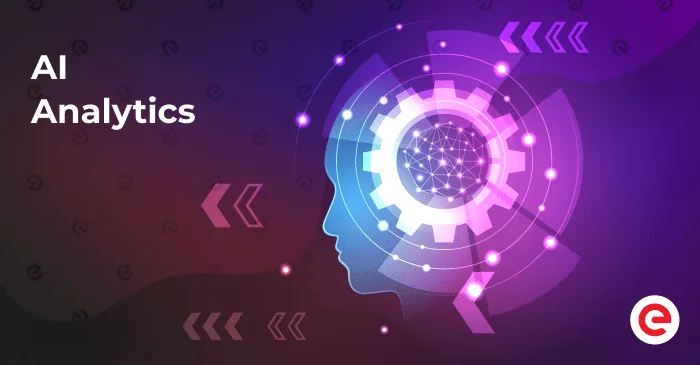
Updated: September 22, 2025
Published: November 21, 2023
Analytics has become an integral part of business over the recent years. But how is AI revolutionizing analytics across different domains? What are the latest market tendencies to be adopted within your products and services? Let’s check this article focusing on AI analytics and how to leverage it to your advantage.
List of the Content
- What is AI analytics?
- Difference between AI and traditional analytics
- How to use AI in data analytics?
- AI analytics benefits
- Business use cases of AI analytics
- Conclusion
WHAT IS AI ANALYTICS
When it comes to advancing different business operations and processes, it is impossible without bringing analytics to the focus. Organizations apply these powerful tools to look at things from new perspectives and introduce better approaches. It makes it easier to identify areas for improvement and evolve efficient strategies.
Companies have access to a variety of analytics tools and approaches to adopt within their processes. They can be classified into different categories and remain specific to the needs of each project. However, one branch is drawing attention and being much discussed at present. So, what is AI analytics, and why is it so popular these days?
It refers to the use of artificial intelligence technologies to analyze and interpret complex data sets. Traditional analytics involve extracting insights from data using statistical methods and predefined rules. However, AI-driven analytics takes it a step further by leveraging algorithms and other AI techniques to discover patterns, correlations, and trends in data.
It enhances data analysis capabilities by incorporating artificial intelligence to provide more accurate, timely, and actionable insights. With AI analytics, systems can learn from data, adapt to new information, and make predictions or recommendations. AI manages to handle the complexity and uncover insights that may be challenging for traditional analytics methods.
The distinct advantage is that it enables teams to process and analyze large amounts of data quickly and efficiently. The abilities of AI turn to become a game changer and uncover new opportunities for businesses across various industries and domains.
With the growing volume of data, the popularity of AI analytics has also been propelled. The efficiency boost of AI data analytics contributes to enhanced productivity and cost savings for businesses. Besides, AI is widely used across different types of analytics. Whether utilizing the specialty area or combining several categories, AI remains a good fit to address the needs and offer effective AI solutions.
AI in descriptive analytics
When it involves analyzing historical data to understand what has happened in the past, AI can be used to automate and enhance the process of extracting insights from large datasets. AI algorithms become much more efficient and comprehensive in descriptive analysis than traditional methods.
AI in diagnostic analytics
The main focus is driven by the ability to analyze considerable amounts of data, resulting in identified patterns and trends. That enables the accurate and efficient diagnosis of problems and opportunities. The speed and efficiency of AI contribute to timely and data-driven decision-making in various domains, from healthcare to business operations.
AI in prescriptive analytics
This type of analytics embraces recommendations to optimize outcomes based on insights. AI takes data analysis a step further by suggesting the best course of action to achieve the desired result. AI enhances prescriptive analytics by handling complex datasets, identifying patterns, and generating actionable recommendations.
AI in predictive analytics
It helps businesses make informed decisions by predicting future trends or behaviors. AI enhances predictive analytics by leveraging its computational power, pattern recognition capabilities, adaptability, automation, and the potential for real-time analysis. That collectively contributes to more accurate and valuable predictions in various fields.
AI in cognitive analytics
Integrating AI in cognitive analytics enables organizations to gain deeper insights, automate repetitive tasks, and make data-driven decisions more intelligently and efficiently. It’s a powerful combination of technologies that enhances the capabilities of ML and AI algorithms, NLP, cognitive computing, real-time analytics, interactive dashboards, etc.
The impact of AI on analytics remains really profound. Thus, AI analytics helps to transform businesses by applying best market practices.
WHAT IS THE DIFFERENCE BETWEEN AI AND TRADITIONAL ANALYTICS
Along with discussing the topic of AI in analytics, it might be helpful to draw a comparison with traditional analytics. The first thing to emphasize is that any analytics is about building the process to discover patterns in data for better decision-making. AI technologies like machine learning, NLP, and computer vision have become reasonable approaches to complement existing analytical approaches. In other words, artificial intelligence actually complements traditional analytics and co-exists with it.
Bringing AI solutions within analytics turns into an integral part of the company’s analytical strategies. These advancing technologies allow them to be one step ahead of competitors while detecting patterns, predicting customer behavior, optimizing performance, etc. It is still an emerging field, though AI capabilities are already impressive. Data analysis has always been a key focus for advancing business opportunities. In turn, AI data analytics supports the latest market approaches and enables improvement over the required business branches and domains. The crucial aspects that differentiate AI analytics from traditional ones are related to the following things.
The limited scope of traditional analytics
One of the distinct differences relies upon the fact that traditional analytics commonly deals with structured data. It often requires additional effort to set the process of data structuring, often including raw data collection. With the limited scope of data analytics, it can be difficult to shift to more advanced analytical approaches. In contrast, AI analytics handles real-time data and seamlessly automates the processing. AI considerably advances business opportunities along with saving time and effort.
More flexibility with AI analytics
AI enhances traditional analytics by offering advanced pattern recognition, personalization, adaptive learning, scalability, and the ability to integrate with other cutting-edge technologies. This combination makes analytics more flexible, powerful, and better suited to meet evolving business needs. This analytics has gone further than just displaying data, like in traditional analytics. It focuses on generating comprehensive insights for the outlined business questions.
Complexity issues within traditional analytics
AI adoption helps to manage some related complexity difficulties posed by traditional approaches. When it lacks the capacity to manage complex data or support various data formats, handling some tasks and procedures is hard. AI solutions bring new perspectives and streamline these tasks to attain better and faster results. It enables real-time insights into critical business operations.
Speedy process powered by AI
Artificial intelligence analytics streamlines the analysis processes by eliminating the need for manual tasks. It handles the comprehensive investigation to get the value from unstructured data through the transformation into structured, searchable, and usable data. AI algorithms embrace processing and analyzing large amounts of data much faster than traditional methods. AI in analytics doesn’t require investigating every hypothesis, as it can handle large data sets within seconds.
The use of AI in analytics definitely helps to advance traditional approaches and open new opportunities for contributing to innovation and efficiency across various industries.
HOW TO USE AI IN DATA ANALYTICS
Artificial intelligence can be leveraged in different ways and across numerous industries. Businesses widely adopt AI data analytics, which positively impacts their operations and supports thriving in a rapidly evolving market. Let’s consider some common use cases of AI in analytics.
Data processing
AI analytics can handle large volumes of data much faster than traditional methods. This is crucial in today’s world, where the amount of data generated is massive and continues to grow exponentially. AI algorithms can quickly process and analyze this data to extract meaningful insights.
Pattern recognition
It excels at recognizing data patterns and trends that are more difficult for humans to identify. This capability is valuable for making predictions, identifying drawbacks, and understanding the underlying structures in complex datasets.
Prediction
AI technologies are often used for predictive modeling, allowing organizations to forecast future trends and behaviors based on historical data. That is particularly useful in fields like healthcare, finance, and marketing for making informed decisions and planning for the future.
Personalization
The use of AI business analytics enables personalized experiences for users and customers. AI systems can provide personalized recommendations, content, and services by analyzing user behavior and preferences, enhancing customer satisfaction and engagement.
Automation of repetitive tasks
It also focuses on automating routine and repetitive tasks involved in data analysis. That improves efficiency and allows human analysts to draw attention to more complex and creative aspects of their work.
Decision-making support
It’s important to use AI systems that can automate routine decision-making processes. It can assist businesses in precisely examining extensive data sets, enabling them to discern trends, patterns, and outliers that could signal potential opportunities or risks.
Optimizing business operations
AI analytics can optimize various business processes by identifying areas for improvement and efficiency. This could include supply chain optimization, resource allocation, and overall operational enhancement.
Customer insights
It remains vital for businesses to understand customer behavior and preferences. Artificial intelligence analyzes customer data to provide insights into buying patterns, preferences, and sentiment, helping companies tailor their products and services.
Competitive advantage
Organizations that effectively leverage AI insights gain a competitive edge. Businesses learn to adapt more quickly to changing market conditions and customer demands by making data-driven decisions and staying ahead of trends.
Learning and improvement
With the continuous improvement of AI models, businesses have the chance to advance their operations, quickly adapt to data pattern changes, and ensure insights’ relevance over time. That extends business opportunities and offers new solutions on all engaged levels.
It’s important to note that the specific use cases of AI business analytics can vary widely depending on the industry, company size, and business goals. Companies often invest in AI analytics to gain a competitive advantage, improve decision-making processes, and enhance overall operational efficiency.
Have you ever wondered how you can adopt AI analytics within your organization?
Feel free to contact Existek’s team. Our experts will gladly provide a consultation to answer your questions and find reasonable solutions for implementation.
AI ANALYTICS BENEFITS
One of the common demands upon implementing AI-powered analytics tools is to understand your business needs and requirements. The final outcomes always depend on the clearly outlined goals and objectives. Companies have to evolve comprehensive strategies when focusing on the benefits they want to gain. Here are some common benefits to gain from leveraging AI insights.
- Enhanced efficiency
It’s much easier and faster to carry out various tasks with AI for data analytics. It embraces data processing, automation, predicting trends, providing customer insights, optimizing business operations, etc. AI in analytics enhances business efficiency and supports advancement on different levels.
- Cost reduction
Automation and optimization supported by artificial intelligence commonly lead to cost savings. Whether it’s in supply chain management, resource allocation, or process optimization, AI can identify areas for improvement and efficiency gains. Along with operational efficiencies, businesses save costs by minimizing errors, accelerating task completion, and identifying unnecessary expenses.
- Improved productivity
AI systems continuously learn from new data, improving their performance over time. The provided adaptability allows teams to stay ahead of changing market conditions and evolving customer preferences. Also, AI analytics tools assist employees in their daily tasks, providing insights and recommendations that improve productivity. This can range from automating routine tasks to offering real-time data for more informed and strategic decision-making.
- Fraud detection and security
That plays a crucial role in security and fraud detection by leveraging advanced algorithms and other techniques to identify patterns, anomalies, and potential threats in large datasets. It’s necessary to implement real-time monitoring systems that use AI and ML algorithms to analyze data streams continuously. Besides, AI models can adapt and improve over time as they learn from new data.
- Risk management
The next benefit of AI-powered analytics is that it helps teams identify and assess risks. By analyzing historical and real-time data, organizations make informed decisions to mitigate risks and respond proactively to potential challenges. AI allows them to go much further than traditional risk management techniques.
- Strategic planning
AI analytics is efficient for revealing patterns and trends in data, helping businesses identify new opportunities for growth, innovation, and market expansion. Besides, it supports valuable insights for long-term strategic planning. It helps businesses set realistic goals, allocate resources effectively, and adapt their strategies based on changing market conditions.
- Innovation and product development
One of the distinct advantages of AI analytics tools is that they inform product development by identifying customer needs, preferences, and trends. This information is crucial for creating innovative products and services that meet market demands. AI-powered tools are great for streamlining customer interactions and campaign performance.
It isn’t hard to compile even a longer list of artificial intelligence benefits, though the main point is that these advantages can be supported across numerous industries. Regardless of the company’s specialization, there is an option to leverage AI for data analytics and have the full benefit of this innovative technology.
BUSINESS USE CASES OF AI ANALYTICS
It’s impressive to discover the use cases of AI across so many industries. It has found its adoption in different domains and complements existing solutions. According to the statistics, 85% of organizations state that leveraging AI is the top priority for their business strategies. The use cases of AI analytics greatly vary, and most importantly, they can embrace domain-specific needs and requirements. Let’s consider some examples to find out how different industries leverage these advancing solutions.
Retail
AI advancements significantly impact changes in the landscape of the retail industry. Businesses have no choice but to find solutions and quickly adapt to rising market demands. AI has brought many new and efficient ways to transform interactions with customers and deliver compelling user experiences. AI analytics extensively works for personalized shopping, supply chain optimization, inventory management, etc. It’s used for promotional forecasts and assortment optimization. AI-driven analytics takes into account many decisive factors, including product demand, purchase history, sized merchandise, or seasonality. Both historical and real-time data powered by AI allow teams to drive sales, enhance customer experience, and reduce operational costs.
Fintech
It was among the first industries to adopt AI technologies to advance their services. Artificial intelligence helps to revolutionize traditional financial practices and reshape the industry with advancing solutions. As for statistics, the AI in fintech market is already estimated to be worth $42.83 billion in 2023 and continues to grow. The success of financial institutions primarily hinges on their capacity to anticipate future challenges and evaluate ongoing business trends. Traditional predictive analysis models frequently encounter limitations attributed to financial markets’ volatility and complexity. AI-powered models handle financial data analysis, forecast investment patterns, support budgeting, etc. Besides, AI can be adopted to improve data security, protect financial transactions, and increase user trust.
Healthcare
Artificial intelligence insights are highly valued across the healthcare industry. The medical domain has found an ever-growing variety of use cases for its specialized adoption. AI analytics in healthcare focuses on enabling personalized medical care, diagnostics improvement, treatment decisions, disease detection, etc. It transforms the future of medicine by bringing new approaches to care delivery, streamlining medical practitioners’ work, and improving public health. AI data analytics is leveraged by all segments of the medical domain, from healthcare providers to any other industry-related parties. AI holds immense potential to cut down costs in healthcare while enhancing patient outcomes.
Looking for more examples of applying artificial intelligence in healthcare?
We recommend checking our latest article about generative AI in healthcare and how it’s leveraged across the medical industry.
Logistics
That is another industry that relies upon data-driven insights. It goes without saying that AI business analytics plays an important role in logistics. The main purpose is related to improving delivery accuracy, operational efficiency, and speed. AI-powered tools allow teams to analyze data on delivery locations, order processing, supply chain, inventory levels, and other tasks. Accurate demand forecasting ensures a smooth delivery process, timely order completion, and customer satisfaction. It’s much easier to handle route planning, inventory management, and even predicting potential disruptions. Besides, AI analytics can identify maintenance needs that help in extending the equipment and vehicle life cycle.
Manufacturing
Businesses are eager to get even more flexibility with bringing AI to their operations and processes. Manufacturing has successfully adapted to the robotics revolution and continues to look for efficient ways to boost productivity and cut expenses. With AI data analytics, they can commonly focus on predictive maintenance, quality control, supply chain management, real-time monitoring, and environmental sustainability. For example, it covers processing data from machinery sensors to predict equipment failures. Besides predicting, AI models are trained to suggest effective maintenance approaches to optimize equipment performance and streamline productivity. Manufacturers gain the tools to manage production in real-time, implement flexible supply chains, and fine-tune performance.
Need additional details on the AI adoption in supply chain?
Find a comprehensive guide on AI in supply chain management and how organizations turn it to their business advantage.
Marketing
AI data analytics can bring efficiency and success to different marketing activities. It’s often related to extracting profound consumer insights, optimizing marketing objectives, and enhancing return on investment. The quality of marketing analytics can be significantly improved when adopting such practices as customer-persona creation, sales forecasting, the purchaser experience advancement, and automated decision-making. AI business analytics allows marketing managers to combine valuable data, automate insights, and evolve upcoming marketing campaigns. Moreover, AI can integrate data from various marketing channels to provide a holistic view of customer interactions. It considerably saves time and effort and boosts productivity.
Business intelligence
AI analytics is widely adopted for advancing business intelligence due to the enhanced process of collecting, analyzing, and interpreting data. Traditional tools for business intelligence have taken an active part in assisting organizations in comprehending their data. However, it’s a good time to adopt more advanced solutions by adding machine learning, NLP, deep learning, predictive analysis, and modeling. It enhances business intelligence by automating processes, improving data accuracy, enabling predictive capabilities, providing personalized insights, and facilitating more advanced and efficient data analysis. This, in turn, empowers organizations to make better-informed decisions and remain competitive in the current dynamic business environment.
These examples highlight the versatility of AI analytics in addressing specific challenges and opportunities across different business domains. AI-powered solutions will continue to evolve as technology advances and organizations find new ways to leverage it for strategic advantage.
CONCLUSION
Businesses across various industries and domains find it eminently reasonable to go beyond traditional approaches. Sometimes, it seems challenging to keep pace with a rapidly developing market. But at the same time, teams have access to all the required means to withstand this tough competition. AI analytics is a complementary solution with a promising future. So, it gets more than recommended to leverage AI in analytics for better insights, decision-making, and continuous improvement.
Have additional questions on AI analytics and its usage within your organization?
Feel free to share your expectations and ask for insights on how AI can address your needs. Our AI experts will gladly answer your questions and provide you with further consultation.
Frequently asked questions
What is AI analytics?
It is a type of data analytics that applies AI algorithms and models to generate valuable insights from enormous amounts of data.
How to use AI in data analytics?
In order to gain valuable insights, patterns, and predictions from large and complex datasets, AI analytics can extend the capabilities of traditional analytics methods. Its usage helps to uncover hidden patterns, optimize decision-making processes, and enhance overall business intelligence.
What are the benefits of AI analytics in business?
AI business analytics support the following advantages:
- Enhanced efficiency
- Cost reduction
- Improved productivity
- Fraud detection and security
- Risk management
- Strategic planning
- Innovation and product development
Why is AI analytics important?
The goals of AI analytics revolve around leveraging artificial intelligence techniques to extract meaningful insights, patterns, and predictions from data. It offers all the tools and means to find efficient ways to streamline operations and tasks on all business levels.

